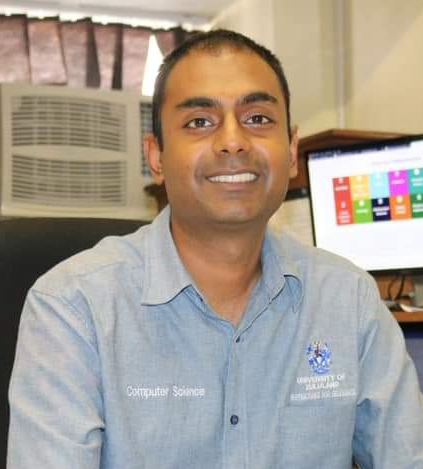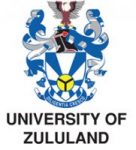
Position: Associate Professor
Phone: +27 35 902 6846
Email: mudalip (at) unizulu.ac.za
Building &Room: D-block office 104
Biography:
Professor Mudali is an Associate Professor of the Department of Computer Science at the University of Zululand since 2023. Prior to this, he was appointed as a Senior Lecturer in the Department from 2017 to 2022.
He holds a BSc (Data Communications Technology), a BSc Honours (Computer Science), a MSc (Computer Science) and a PhD (Computer Science) that was awarded in 2017. All of his qualifications were obtained from the University of Zululand. Prof Mudali is a member of the Institute of Electrical and Electronic Engineers (IEEE) and the South African Institute of Computer Scientists and Information Technologists (SAICSIT).
He currently lectures the Introductory Software Engineering, Systems Programming and Software Defined Networks courses and supervises undergraduate Software Development projects. A provisional SA patent was received in 2015 for work done with his 2nd year students to prevent distracted driving. Mudali is also a CISCO NetAcad Instructor.
Prof Mudali has experience of both mentoring and supervising Honours and Masters students. Since obtaining his PhD, he has been involved in the supervision of PhD students. He has participated in externally-funded research projects at the Department of Computer Science since 2006 and he has also led the Wireless Mesh Networks research group in the Department since 2009. His group has produced 3 PhD theses and 8 MSc dissertations since its inception. His research group has also published more than 40 articles and conference papers in accredited outlets.
The research group that he leads is currently investigating aspects of SDN, Fog Computing and the IoT. The SDN research focuses on switch and controller placement as well as a model for migrating from traditional enterprise networks to SDN. The Fog Computing research focuses on the integration with IoT for emerging-market use cases. The IoT research focuses on gateway placement strategies for IoT networks deployed using LoRaWAN. The group’s current research efforts lean heavily on the expertise gained from earlier research endeavours mentioned below.
His past research interests have revolved around energy-efficient Wireless Ad-hoc Networks for rural usage scenarios. He has focused primarily on Wireless Mesh Networks and Sensor Networks. The research group that he leads has previously investigated Routing Protocol performance and energy-efficiency, Transport Protocol performance and energy-efficiency, Gateway selection in rural settings, the selection of Mesh Key Distributors, the energy-efficiency of combinations of Routing and Transport protocols, Auto-configuration and the influence of distance from the Gateway on node performance in Wireless Mesh Networks. These learnings were subsequently applied to the tactical military environment where efficiency and performance under mobile scenarios were also considered.
Lecture’s the following modules:
- Introductory Software Engineering,
- Systems Programming
- Wireless Mesh Networking component of an Honours course.
- He also supervises undergraduate Software Development projects.
- Dr Mudali is also a CISCO NetAcad instructor.
Qualifications:
PhD, MSc, BSc Hons, BSc (UNIZULU)
Honours/Awards (include online reference for each honour/ award):
- Innovation Award for a Patent Filing, University of Zululand Research Awards, 2016
- Innovation Award for a Patent Filing, University of Zululand Research Awards, 2015
- Provisional SA Patent, SmartDrive application to prevent distracted driving, 2015
- Best Paper Award – Third Place, Southern African Telecommunications and Network Applications Conference (SATNAC), 2014
Professional membership:
- Institute of Electrical and Electronics Engineers (IEEE)
- South African Institute of Computer Scientists and Information Technologists (SAICSIT)
Research interests:
Prof Mudali has experience of both mentoring and supervising Honours and Masters students. Since obtaining his PhD, he has been involved in the supervision of PhD students. He has participated in externally-funded research projects at the Department of Computer Science since 2006 and he has also led the Wireless Mesh Networks research cluster in the Department since 2009. His cluster has produced 3 PhD theses and 8 MSc dissertations since its inception and produced more than 40 articles and conference papers in accredited outlets.
The research cluster that he leads is currently investigating aspects of SDN, Fog Computing and the IoT. The SDN research focuses on switch and controller placement as well as a model for migrating from traditional enterprise networks to SDN. The Fog Computing research focuses on the integration with IoT for emerging-market use cases. The IoT research focuses on gateway placement strategies for IoT networks deployed using LoRaWAN. The group’s current research efforts lean heavily on the expertise gained from earlier research endeavours mentioned below.
His past research interests have revolved around energy-efficient Wireless Ad-hoc Networks for rural usage scenarios. He has focused primarily on Wireless Mesh Networks and Sensor Networks.
The research cluster has previously investigated Routing Protocol performance and energy-efficiency, Transport Protocol performance and energy-efficiency, Gateway selection in rural settings, the selection of Mesh Key Distributors, the energy-efficiency of combinations of Routing and Transport protocols, Auto-configuration and the influence of distance from the Gateway on node performance in Wireless Mesh Networks. These learnings were subsequently applied to the tactical military environment where efficiency and performance under mobile scenarios were also considered.
